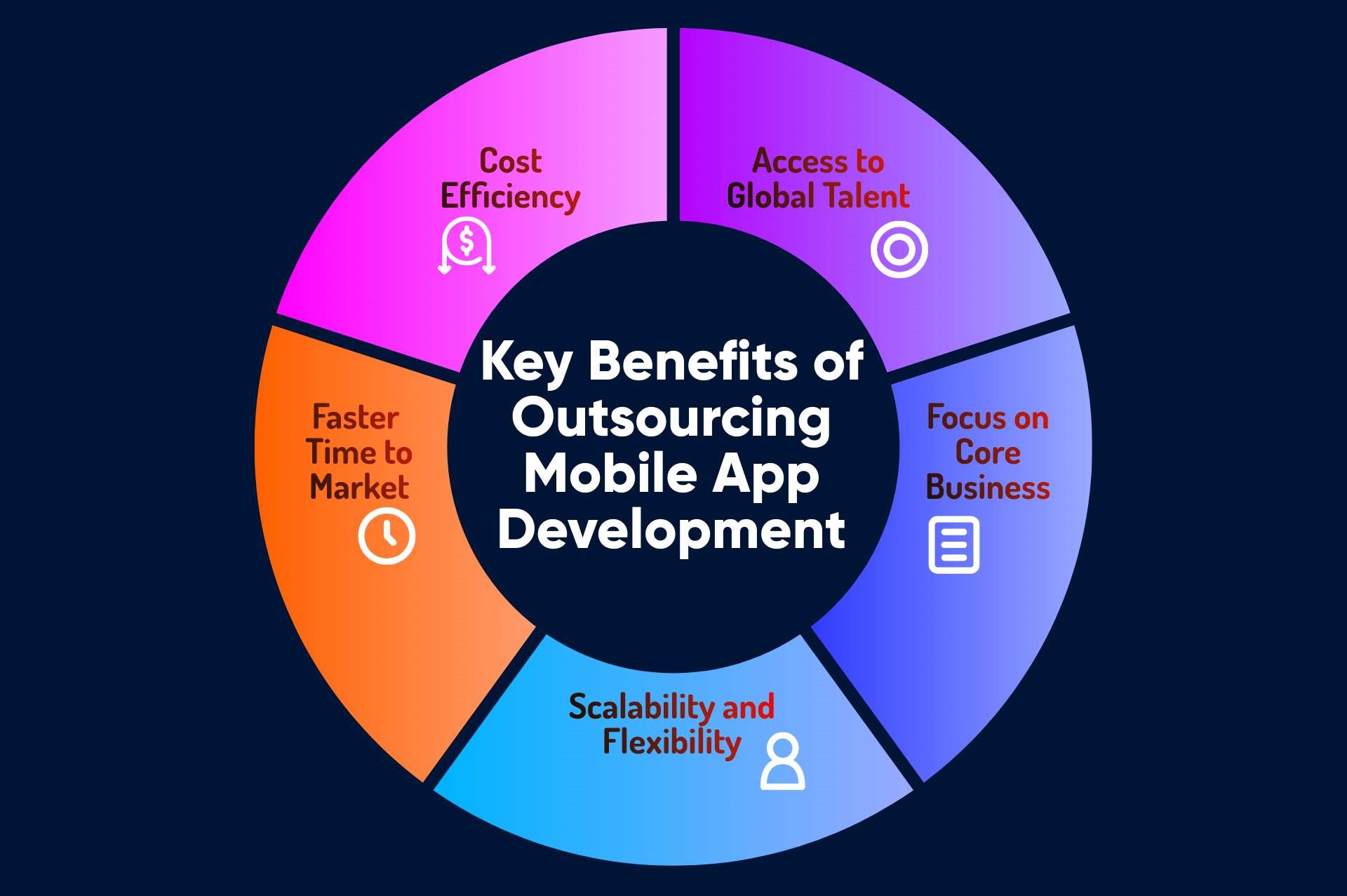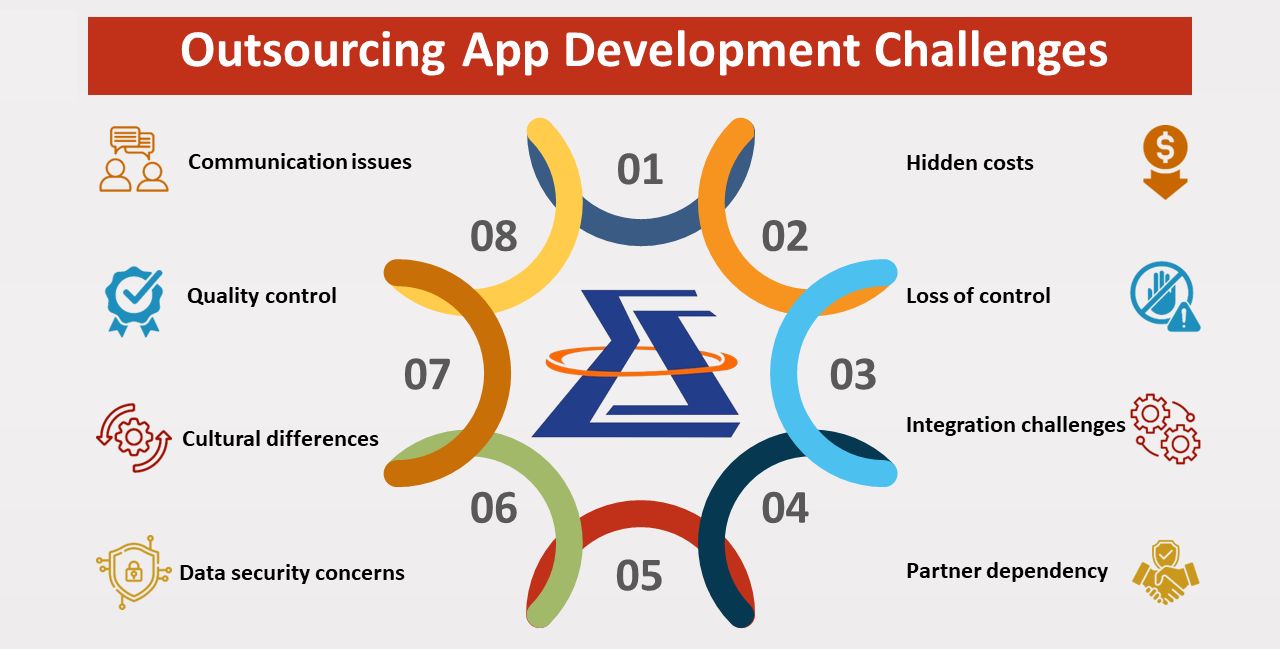Introduction
The mobile application is an invention that features in the business landscape and is crucial in ensuring that a business has a stand in the ultra-modern developed world. Entrepreneurs consider outsourcing mobile app development as a key trend, and more and more organizations turn to efficient and easily usable apps.
This includes engaging professional mobile app development outsourcing companies that develop mobile applications for organizations that outsource mobile application developers, who are often offshore.
This article takes an in-depth look at the lifelong opportunities that outsourcing mobile app development renders toward assisting businesses in extracting optimum value from their mobile commercial, as well as any app development plans and undertakings in the mobile domain.
What is Outsourcing in Mobile App Development?
Outsourcing applies in mobile app development, which is a process of contracting third-party developers to develop mobile applications instead of using their own employees. Businesses outsource mobile app development when in-house development is incapable or expensive.
Scenarios for Outsource Mobile App Development:
- Entrepreneurs who do not have sufficient technical knowledge look for professional developers to help them build their app concepts as soon as possible and to a high standard.
- Large organizations require a new app in their portfolio without putting pressure on the IT department to outsource certain projects.
- Organizations engage in outsourcing because they cannot offer certain skills in-house, for instance, to implement AR/VR or use a blockchain.
- Bridging time constraints that are common, especially when app releases are due, some firms outsource to tap into the efficiency of dedicated teams.
- Some of the reasons why organizations prefer outsourcing their developments include the desire to cut development costs but, at the same time, come up with quality products; this is achieved by getting services from countries that offer cheap labor.
Region Wise Outsourcing Trends and Costs:
India:
India is considered competitive in terms of cost and has a huge talent base regarding developers. The average cost of developing an application falls between 15 dollars and 80 dollars per hour.
China:
China’s strengths include a combination of affordable prices for labor and materials as well as high technological capabilities. The charges per hour range from $25 to $100.
Europe (Eastern):
This provider has a good and not very expensive offer; rates vary between $25 and $150 per hour.
North America:
Expensive than the fixed price contracts but commonly used due to complications that are involved in the work to be done. They vary from $100 to $250 per hour.
Southeast Asia:
Rising to the rankings of a preferred outsourcing location thanks to the USD 20-100 per hour rates.
Key Benefits of Outsourcing Mobile App Development

Cost Efficiency
Outsourcing is an effective strategy because it is much cheaper to outsource a mobile application than to develop it in-house. Hiring independent mobile app developers allows businesses to save up to 60% of the development cost due to lower labor costs and the want of overheads typical of strong employees.
Access to Global Talent
Managing application development sourcing allows them to tap into a global talent pool. This enables organizations to access specialization and expertise they may lack, which is costly to obtain locally, thus improving the quality and innovation of mobile applications.
Faster Time to Market
This is especially beneficial for businesses because, by outsourcing to mobile app development companies, they can progress through the development process much quicker. If one hires dedicated teams who work at different shifts, activities run constantly; hence it may cut time-to-market by 40%.
Focus on Core Business
A business is able to refocus on its core operations by outsourcing mobile app development. If difficult technical issues are handed over to skilled professionals, the internal teams can concentrate on visioning and branding, as well as other core activities.
Scalability and Flexibility
The benefits of outsourcing app development outweigh the costs. Outsourcing also means that development resources can be scaled easily. It allows companies to scale up or down quickly depending on the demands of a given project, like holiday apps that may need updates several times.
Comparison: Outsourcing vs. In-House Development
| Aspect | Outsourcing | In-House Development |
|---|---|---|
| Cost | Generally lower due to reduced overhead and competitive rates | Higher due to full-time salaries, benefits, and infrastructure costs |
| Expertise | Acquires talent from a vast pool of professional skills | Limited to in-house team's expertise |
| Time to Market | Typically faster due to dedicated resources | It can be slower, depending on the current workload and team size |
| Control | Less direct control, but can be mitigated with proper management | Complete control over the development process |
| Communication | May face challenges due to time zones and cultural differences. | Easier and more immediate |
| Scalability | Highly flexible, easy to scale up or down | Limited by current team size and hiring capabilities |
| Focus | Allows focus on core business activities | Divide attention between app development and core activities. |
| Long-term Costs | Variable, based on project needs | Fixed ongoing costs for maintaining an in-house team |
Outsourcing App Development Challenges and Remedies
Common challenges of Outsourcing app development:

Communication issues:
Different languages and time we are in different time zones, which may cause misunderstandings and slow down the progress of the project.
Quality control:
When outsourcing, it can be difficult to maintain a quality that’s on par with the different teams or developers.
Cultural differences:
These differences could affect project management and coordination among teams with different work ethics and practices.
Data security concerns:
There is always a possibility of leakage of details, which may compromise the company’s intellectual property as well as the user’s information.
Hidden costs:
During the development stage, businesses may incur project management costs, costs for upgrading the apps, or for additional features.
Loss of control:
On the other hand, involving an outside team could be discouraging for some since it creates the impression of relinquishing ownership of the project.
Integration challenges:
Integrating outsourced development projects with current systems and workflows may not be an easy task.
Partner dependency:
The solution leans heavily on an external team, which means there are potential weaknesses in decision-making if the partnership sours.
Strategies to mitigate the challenges of Outsourcing app development:
Establish clear communication protocols:
Hold weekly or biweekly video meetings, create project progress checklists on project management platforms, and establish response time standards.
Implement rigorous quality assurance processes:
Create a clear vision and set of quality requirements, quarterly code inspections, and extensive testing throughout software creation.
Invest in cultural training:
Sensitize the internal and external tribes on cultural differences to ensure that the working relationships between them are more cordial.
Implement robust security measures:
Ensure the use of encrypted file transmission, non-disclosure agreements, and compliance with data protection laws to prevent data breaches and cyber threats to key IT assets.
Create detailed project scopes:
Before the start of the project, all requirements and deliverables should be set to ensure that no extra and unforeseen costs are charged.
Maintain active involvement:
Closely manage the outsourced team by appointing an in-house project manager to retain decision-making influence.
Develop a comprehensive integration plan:
Ensure that a tech partner offers close cooperation to design the best integration with the existing systems.
Diversify outsourcing partners:
Technological dependency can hinder growth. Businesses should diversify their outsourcing partners according to their niche and reduce dependency for minimum downtime and optimum performance.
Importance of Choosing the Right Outsourcing Partner:
- With a reliable marketer in place, you are guaranteed excellent quality work and timely delivery of any app development project.
- The right mobile app development outsourcing companies can evolve into a key strategic partner that provides support and potentially can collaborate on future projects with the company.
- An experienced outsourcing company is always beneficial, as they have valuable inputs and effective solutions that can improve your app’s quality.
- A credible technology partner protects assets that are your competitive advantage, such as ideas, know-how, and other confidential information that may fall under the purview of intellectual property.
- Support and maintenance are critical for any mobile app to succeed. A strategic technology partner can provide both and work alongside to envisage future goals effectively.
How to Choose the Right Mobile App Development Outsourcing Partner
Experience:
Ensure that the partners have the necessary past experience in app development, particularly in your business sector or the app style.
Portfolio:
Look at their previous work in order to get an impression of the quality, innovation, or range of the services they offer in mobile app development.
Client reviews:
Also, when evaluating the quality of this company, one has to peruse the comments of different clients to establish the level of satisfaction that patients have with regard to the services offered by this company and its reputation in the market.
Technical expertise:
Never assume that your outsourcing partner has the right skills and tools for the job, particularly when it comes to newer and more modern tools you might require.
Communication skills:
Evaluate how effectively they can share information and in what frequency; this is very important when it comes to offshore mobile app development.
Scalability:
Select a partner that can increase or decrease the resources for a project depending on your requirements and the prospective expansion.
Outsourcing Agreement Guideline
A brief tutorial regarding the things to be taken into consideration when entering contracts and agreements.
Define project scope:
It is recommended to specify all the aspects of the service and product’s features, functions, and the results of development to prevent misinterpretation and the subsequent growth of the project’s range during the development process.
Establish timelines:
Define attainable goals with timelines for each of the project’s phases, including contingency time.
Specify ownership rights:
Instruct that upon payment, all materials produced in the course of project implementation would be the sole property of your company.
Detail payment terms:
To avoid any controversy that may arise out of the financial aspect, clearly state the total amount you will be charged, the timeline when the charges will be made, and any circumstances that may lead to further charges.
Include confidentiality clauses:
For that, you should ensure your personal data and the idea of the app are well-guarded by signed non-disclosure and data protection agreements.
Define quality standards:
Request acceptance criteria, test methods, and outcomes in order to reach an agreement on the app that will be delivered.
Source: https://www.sigmasolve.com/the-benefits-of-outsourcing-mobile-app-development/













